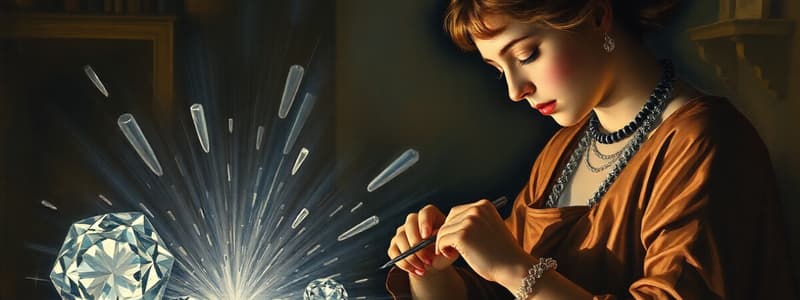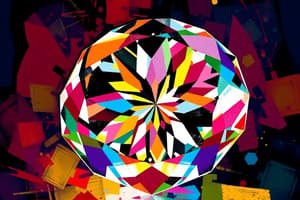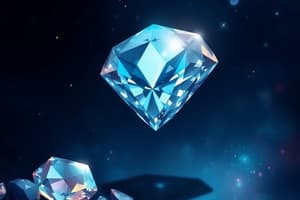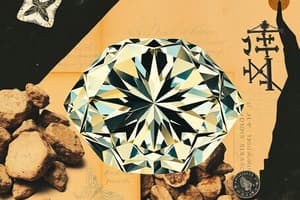Podcast
Questions and Answers
What is the purpose of using a sharp piece of diamond to scrape a notch into the marked rough before cleaving?
What is the purpose of using a sharp piece of diamond to scrape a notch into the marked rough before cleaving?
- To facilitate a clean split of the diamond (correct)
- To make the diamond easier to polish
- To enhance the clarity of the diamond
- To increase the diamond's weight retention
Which cutting technique primarily utilizes computer software for improved precision?
Which cutting technique primarily utilizes computer software for improved precision?
- Laser sawing (correct)
- Hand-cutting
- Blade sawing
- Manual bruting
What advancement in bruting occurred in the late 1980s?
What advancement in bruting occurred in the late 1980s?
- Use of lasers in bruting
- Increased reliance on manual bruting techniques
- Automation of the bruting process (correct)
- Introduction of diamond-studded lathes
What describes the technique that allows for shaping fancy and asymmetrical diamonds?
What describes the technique that allows for shaping fancy and asymmetrical diamonds?
How did the invention of the rotary saw impact the diamond cutting process?
How did the invention of the rotary saw impact the diamond cutting process?
What feature distinguishes the old European cut from the old mine cut?
What feature distinguishes the old European cut from the old mine cut?
Which technological advancement significantly influenced diamond cutting in the late 1800s?
Which technological advancement significantly influenced diamond cutting in the late 1800s?
Who published the round brilliant cut proportions in 1919 that influenced diamond cutting?
Who published the round brilliant cut proportions in 1919 that influenced diamond cutting?
What was a priority for diamond cutters prior to the 1900s?
What was a priority for diamond cutters prior to the 1900s?
What aspect of the modern brilliant cut developed in the 1950s helped to avoid chipping?
What aspect of the modern brilliant cut developed in the 1950s helped to avoid chipping?
What term describes the elongated oval shape of diamonds resembling a woman's lips?
What term describes the elongated oval shape of diamonds resembling a woman's lips?
Which of the following advancements aided in the cutting of fancy shapes starting in the 16th century?
Which of the following advancements aided in the cutting of fancy shapes starting in the 16th century?
What was emphasized in the marketing of 'ideal cut' round brilliants in the 1990s?
What was emphasized in the marketing of 'ideal cut' round brilliants in the 1990s?
Which cut emerged as the dominant diamond cut by the 1950s?
Which cut emerged as the dominant diamond cut by the 1950s?
What was a key factor in the efficiency of cutting odd-shaped and off-color diamonds?
What was a key factor in the efficiency of cutting odd-shaped and off-color diamonds?
What characteristic defines the table cut introduced in the mid- to late 1400s?
What characteristic defines the table cut introduced in the mid- to late 1400s?
Which cut appeared first in the evolution of diamond cuts?
Which cut appeared first in the evolution of diamond cuts?
What is a significant feature of the rose cut introduced in the early 16th century?
What is a significant feature of the rose cut introduced in the early 16th century?
What was the impact of the single cut introduced in the mid-1600s?
What was the impact of the single cut introduced in the mid-1600s?
How many facets does the old mine cut typically have?
How many facets does the old mine cut typically have?
What distinguishes the briolette cut from the rose cut?
What distinguishes the briolette cut from the rose cut?
What feature is common to both the point cut and the table cut?
What feature is common to both the point cut and the table cut?
What was the significant innovation of the double rose cut?
What was the significant innovation of the double rose cut?
Which diamond cut was popular until the 19th century and utilized flat rough or chips?
Which diamond cut was popular until the 19th century and utilized flat rough or chips?
What prompted the modification from the table cut to the single cut in the mid-1600s?
What prompted the modification from the table cut to the single cut in the mid-1600s?
What process was essential for preparing a rough diamond for faceting?
What process was essential for preparing a rough diamond for faceting?
Which century saw the invention of the motorized diamond saw, revolutionizing diamond cutting?
Which century saw the invention of the motorized diamond saw, revolutionizing diamond cutting?
Which innovation allowed for genuine faceting of diamonds in the 16th century?
Which innovation allowed for genuine faceting of diamonds in the 16th century?
What was one of the primary centers of diamond cutting and trading in the 15th century?
What was one of the primary centers of diamond cutting and trading in the 15th century?
Which factor contributed to the global exploration and increase of rough diamonds in Europe during the 15th century?
Which factor contributed to the global exploration and increase of rough diamonds in Europe during the 15th century?
What significant advancements in diamond cutting technologies occurred in the 1980s?
What significant advancements in diamond cutting technologies occurred in the 1980s?
What belief did ancient people hold regarding rough diamonds?
What belief did ancient people hold regarding rough diamonds?
Which technological development primarily facilitated the efficiency of diamond cutting in the 20th century?
Which technological development primarily facilitated the efficiency of diamond cutting in the 20th century?
What is the most crucial stage in the diamond cutting process?
What is the most crucial stage in the diamond cutting process?
Which diamond cut was patented by Henry Grossbard in the late 1970s?
Which diamond cut was patented by Henry Grossbard in the late 1970s?
Which region is recognized for being at the forefront of diamond cutting technology?
Which region is recognized for being at the forefront of diamond cutting technology?
What technology is increasingly being used in the modern diamond cutting process?
What technology is increasingly being used in the modern diamond cutting process?
What term is commonly used to refer to any triangular brilliant diamond?
What term is commonly used to refer to any triangular brilliant diamond?
What is a key factor that diamond planners study during the planning stage?
What is a key factor that diamond planners study during the planning stage?
What shape of diamond cut appeared shortly after the radiant cut?
What shape of diamond cut appeared shortly after the radiant cut?
What is the primary purpose of using a polariscope during the diamond cutting process?
What is the primary purpose of using a polariscope during the diamond cutting process?
Which diamond cut is notably favored in Indian-style jewelry?
Which diamond cut is notably favored in Indian-style jewelry?
During which stage of diamond cutting are rough diamonds divided into sections?
During which stage of diamond cutting are rough diamonds divided into sections?
What early cut introduced the culet?
What early cut introduced the culet?
What polishing step forms the main crown and pavilion facets?
What polishing step forms the main crown and pavilion facets?
Flashcards
Diamond Cutting History
Diamond Cutting History
The historical evolution of techniques used to shape and polish rough diamonds into gems.
Early Diamond Cutting Practices
Early Diamond Cutting Practices
Early diamond cutting primarily involved superficial polishing due to limitations in tools and techniques.
Cleaving
Cleaving
A method of splitting diamonds along specific crystal directions using existing cleavage planes.
Bruting
Bruting
Signup and view all the flashcards
Motorized Diamond Saw
Motorized Diamond Saw
Signup and view all the flashcards
Diamond Cutting Centers
Diamond Cutting Centers
Signup and view all the flashcards
Modern Diamond Industry
Modern Diamond Industry
Signup and view all the flashcards
20th Century Diamond Cutting Advancements
20th Century Diamond Cutting Advancements
Signup and view all the flashcards
Radiant Cut
Radiant Cut
Signup and view all the flashcards
Princess Cut
Princess Cut
Signup and view all the flashcards
Polki Diamonds
Polki Diamonds
Signup and view all the flashcards
Diamond Cutting Stages
Diamond Cutting Stages
Signup and view all the flashcards
Diamond Cutting Planning
Diamond Cutting Planning
Signup and view all the flashcards
Crystal Direction
Crystal Direction
Signup and view all the flashcards
Mapping Diamond Rough
Mapping Diamond Rough
Signup and view all the flashcards
Computer-Aided Planning
Computer-Aided Planning
Signup and view all the flashcards
Strain in Diamond
Strain in Diamond
Signup and view all the flashcards
Dividing Rough Diamonds
Dividing Rough Diamonds
Signup and view all the flashcards
Point Cut
Point Cut
Signup and view all the flashcards
Table Cut
Table Cut
Signup and view all the flashcards
Rose Cut
Rose Cut
Signup and view all the flashcards
Double Rose
Double Rose
Signup and view all the flashcards
Briolette Cut
Briolette Cut
Signup and view all the flashcards
Single Cut (Eight Cut)
Single Cut (Eight Cut)
Signup and view all the flashcards
Mazarin Cut (Double Cut)
Mazarin Cut (Double Cut)
Signup and view all the flashcards
Old Mine Cut
Old Mine Cut
Signup and view all the flashcards
What defines the brilliance of a diamond cut?
What defines the brilliance of a diamond cut?
Signup and view all the flashcards
How do diamond cuts evolve?
How do diamond cuts evolve?
Signup and view all the flashcards
Cleaving Diamonds
Cleaving Diamonds
Signup and view all the flashcards
Rotary Saw's Impact
Rotary Saw's Impact
Signup and view all the flashcards
Laser Sawing Advantage
Laser Sawing Advantage
Signup and view all the flashcards
Bruting's Role
Bruting's Role
Signup and view all the flashcards
Laser Bruting for Fancy Shapes
Laser Bruting for Fancy Shapes
Signup and view all the flashcards
Old European Cut
Old European Cut
Signup and view all the flashcards
Marquise Cut
Marquise Cut
Signup and view all the flashcards
Modern Brilliant Cut
Modern Brilliant Cut
Signup and view all the flashcards
Round Brilliant Cut
Round Brilliant Cut
Signup and view all the flashcards
Henry Morse
Henry Morse
Signup and view all the flashcards
Marcel Tolkowsky
Marcel Tolkowsky
Signup and view all the flashcards
Weight Retention
Weight Retention
Signup and view all the flashcards
Ideal Cut
Ideal Cut
Signup and view all the flashcards
Fancy Brilliant Cut
Fancy Brilliant Cut
Signup and view all the flashcards
Trillion Cut
Trillion Cut
Signup and view all the flashcards
Study Notes
Diamond Cutting History
- Thousands of years ago, people considered diamonds sacred and did not cut or shape them.
- Early diamond cutting, in India and Europe (mid-1300s), was primarily superficial polishing.
- Cleaving, splitting diamonds along crystal directions, became possible in the mid-1400s.
- Increased global exploration and trade (15th century) led to more rough diamonds reaching Europe.
- European cities (Venice, Amsterdam, Antwerp, London) became diamond trading hubs.
- Jewish communities played key roles in the diamond industry.
- Precise rotary motion in diamond cutting (16th century) and cast-iron polishing wheels expanded cutting capabilities.
- Bruting, shaping a rough diamond into its basic face-up outline, became an essential step (early 1870s).
- The motorized diamond saw (1900s) with a circular diamond-coated blade significantly improved efficiency.
- The 1930s saw the establishment of diamond cutting factories in Israel by Belgian and Dutch Jews.
- The late 19th-century discoveries in Africa and the subsequent reawakening of the Indian diamond cutting industry in the late 19th and early 20th centuries significantly expanded diamond supply and demand.
- The 20th century (1980s) brought advancements such as rough mapping, computerized planning, and laser processing, making diamond cutting more efficient and profitable.
Evolution of Diamond Cuts
- Early cuts (13th-15th centuries) were often based on the rough octahedral shape, including the point cut.
- The point cut was an early diamond cut that followed an octahedral shape (13th–15th centuries).
- The table cut emerged in the mid- to late 1400s when cutters found that tips of stones chipped easily.
- The table cut polished a square facet resembling a tabletop.
- The rose cut (early 16th century) was popular until the 19th century, featuring a flat bottom and triangular facets.
- The rose cut made efficient use of flat chips or cleaved facets.
- Briolette, a variation of the rose cut, had faceted peaks on both sides, resembling an elongated double rose.
Evolution of Cuts (continued)
- Single cut (mid-1600s) had more facets than the table cut, offering more potential brilliance.
- The Mazarin cut (mid-17th century) was a cushion cut (with 34 facets) for Cardinal Mazarin
- The Old Mine cut (18th century) had a high crown, deep pavilion, and large culet, less brilliant than modern cuts.
- European Cuts (similar to old mine cut) with circular girdle were developed before bruting machines.
- The marquise cut was an elongated oval with pointed ends, resembling a woman's lips.
- The modern brilliant cut emerged in the 1900s, emphasizing brilliance and fire with specific proportions.
- The round brilliant has dominated the market since the early 1900s.
- Henry Morse (late 1800s) developed round brilliant cut proportions for better round shapes.
- Marcel Tolkowsky (1919) published round brilliant proportions similar to Morse's.
- Weight retention was a primary concern before 1900.
Fancy Brilliant Cuts
- Fancy shape diamonds were cut in the 16th century; The round brilliant's success motivated applying the style to fancy shapes.
- New shapes offered better use of uneven rough.
- Technological advancements made fancy shapes more affordable and efficient.
- The Trillion (early 1960s) and Radiant (late 1970s) and Princess cuts were popular variations following the rounded brilliant cuts.
Cutting Process and Technology
- Diamond cutting involves planning, rough dividing, outline shaping, and polishing.
- Planning is crucial (studying the characteristics of the rough: crystal directions, surface features, and inclusions).
- Crystal direction is important for planning rough division.
- Modern technology (software-assisted) is crucial for optimizing weight retention and commercial value in planning a cutting procedure.
- Dividing the rough is done precisely, with techniques like cleaving (rarely used now) and sawing (a process that uses tools to separate the rough).
- Bruting (using a diamond or machine) reshapes the rough to a specific profile.
- Coning forms the pavilion angle of a diamond (automated).
- Polishing gives the final dimensions and facets to the diamond. (uses diamond powder and a rotating wheel).
- Blocking is important for establishing the diamond's basic symmetry.
- Quality control is essential for ensuring that diamonds meet standards.
Studying That Suits You
Use AI to generate personalized quizzes and flashcards to suit your learning preferences.




